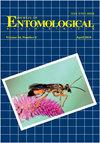An Epsilon Class Glutathione S-Transferase Gene Contributes to the Phytochemical Susceptibility of Tribolium castaneum (Coleoptera: Tenebrionidae)1
IF 0.7
4区 农林科学
Q4 ENTOMOLOGY
引用次数: 0
Abstract
Evidence is accumulating that insect epsilon class glutathione S-transferases (GSTs) play an important role in the resistance to xenobiotics such as insecticides. A Tribolium castaneum (Herbst) (Coleoptera: Tenebrionidae) epsilon class GST gene, TcGSTe17, was previously found to be significantly induced following exposure to the plant derivative eucalyptol. However, whether TcGSTe17 is involved in resistance to eucalyptol remains unclear. In this study, TcGSTe17 was cloned from the T. castaneum. Development stage expression profiling revealed that TcGSTe17 was expressed at all development stages of T. castaneum but was highly expressed in late-stage larvae. Subsequent expression profiling of tissues showed that TcGSTe17 was highly expressed in the gut of larvae and the fat body of adults, and also revealed gender-specific expression patterns. In addition, the transcripts of TcGSTe17 were significantly increased following exposure to eucalyptol, and RNAi increased the susceptibility of the beetles to eucalyptol. Collectively, these results suggest that TcGSTe17 contributes to the susceptibility of T. castaneum to eucalyptol. These findings provide new data for the prevention of pest resistance.Epsilon 类谷胱甘肽 S-转移酶基因有助于提高蓖麻毛虫(鞘翅目:鳞翅目)对植物化学物质的敏感性1
越来越多的证据表明,昆虫epsilon类谷胱甘肽S-转移酶(GSTs)在抗异种生物(如杀虫剂)方面发挥着重要作用。以前曾发现,在暴露于植物衍生物桉叶油醇后,蓖麻毛虫(鞘翅目:Tenebrionidae)的epsilon类谷胱甘肽S转移酶基因TcGSTe17会被显著诱导。然而,TcGSTe17 是否参与了桉叶油醇抗性的产生仍不清楚。本研究从蓖麻中克隆了 TcGSTe17。发育阶段表达谱分析显示,TcGSTe17 在蓖麻蝇的所有发育阶段均有表达,但在晚期幼虫中表达量较高。随后的组织表达谱分析显示,TcGSTe17在幼虫的肠道和成虫的脂肪体中高表达,而且还发现了性别特异性表达模式。此外,暴露于桉树醇后,TcGSTe17 的转录物显著增加,RNAi 增加了甲虫对桉树醇的敏感性。总之,这些结果表明,TcGSTe17有助于提高甲虫对桉树醇的敏感性。这些发现为防止害虫产生抗药性提供了新的数据。
本文章由计算机程序翻译,如有差异,请以英文原文为准。
求助全文
约1分钟内获得全文
求助全文
来源期刊
CiteScore
1.20
自引率
11.10%
发文量
40
审稿时长
>12 weeks
期刊介绍:
The Journal of Entomological Science (ISSN 0749-8004) is a peer-reviewed, scholarly journal that is published quarterly (January, April, July, and October) under the auspices of the Georgia Entomological Society in concert with Allen Press (Lawrence, Kansas). Manuscripts deemed acceptable for publication in the Journal report original research with insects and related arthropods or literature reviews offering foundations to innovative directions in entomological research

 求助内容:
求助内容: 应助结果提醒方式:
应助结果提醒方式:


